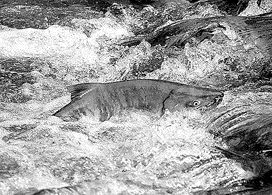forum
library
tutorial
contact

Obama 'Best Hope' for Salmon
by Gordon HamiltonThe Times Colonist, February 4, 2009
|
the film forum library tutorial contact |

|
Obama 'Best Hope' for Salmon
by Gordon HamiltonThe Times Colonist, February 4, 2009 |
Former fisheries minister says president is warm to climate change
 U.S. President Barrack Obama holds the best hope for the future of the Pacific salmon, former Canadian fisheries minister David Anderson told an international state of the salmon conference yesterday.
U.S. President Barrack Obama holds the best hope for the future of the Pacific salmon, former Canadian fisheries minister David Anderson told an international state of the salmon conference yesterday.
The U.S. president's commitment to addressing climate change is likely to pull Canada and other Pacific nations into the new American direction if they want to keep trade links open, Anderson said.
And that, coupled with the hundreds of billions being spent in economic stimulus programs, opens the door for research into some of the alarming trends scientists are observing in the Pacific.
"There's a warming in Washington to the issue of climate change," Anderson said. "It seems to me we will be following the American lead ... It's really up to Mr. Obama; not up to our current prime minister in Ottawa."
Anderson, who was fisheries minister in the Chretién government, was speaking to scientists and policy-makers at the State of the Salmon conference now underway in Vancouver.
Delegates come from what conference organizers term the Salmon Nation -- the arc of North Pacific Rim countries from Japan, Korea and Russia in Asia to Alaska, B.C. and the U.S. West Coast who all share the salmon resource.
They have gathered in Vancouver to share research and address growing concern over the impacts climate change is having on salmon species.
Anderson urged the scientists to grab the immediate opportunity before them to push for research now while Obama still has political capital and countries like the U.S. and Canada are embarking on deficit spending to keep their economies alive.
Salmon can be a "poster species" for climate change in the Pacific as is the polar bear for climate change in the arctic, he said.
Climate change is clearly the most pressing issue facing salmon, who spend most of their lives in the open North Pacific, said State of the Salmon conference co-chair Brian Riddell.
"The Pacific is a big place. And we have five member nations around it interested in salmon. And all five have expressed a commitment to work together," he said.
Other speakers at the conference said alarming signals are coming from the Pacific that point to major changes now underway, from salmon harvests on the increase in the Russian Far East to the sharp declines in British Columbia.
"Subtle changes in climate in the last century have come with dramatic changes of total abundance in Pacific salmon," said Nathan Mantua of the University of Washington's Joint Institute for the Study of Atmosphere and Oceans, who forecast a greater rate of change as oceans warm.
Mantua said some factors influencing salmon include changing winds and currents and a little understood flip-flop of ocean temperatures in the last year or so that has caused colder water on the North American coast and warmer water in the open Pacific.
But climate change is beginning to over-ride these normal occurrences, he said.
"Big changes are already underway," Mantua said. "There is a chaotic element to the climate system. It wanders off. It can wander around in interesting ways.
"But behind those wanderings there is a longer-term trend," he said. "You can pick out the global warming signal from the noise of natural climate fluctuations."
Ocean temperatures are rising overall and so is the ocean's acidity as it absorbs carbon dioxide.
"The chemistry is very simple. The added CO2 in the atmosphere is being absorbed into the ocean and forming a weak carbonic acid."
He said many food sources for salmon will be unable to survive in a more corrosive ocean.
"Many part of the food web are at risk," he said. "Scientists are really just starting to dig into this. It's not clear what the food web impacts will be."
Vladimir Belyaev, director of the federal Russian fisheries agency, said once the salmon return to coastlines, the runs that are in danger are those where human influence is the greatest.
In conjunction with the conservation group Wild Salmon Centre, Belyaev has embarked on a global first by introducing the world's only headwaters-to-ocean protected area for salmon.
It is in the Kamchatka Peninsula, one of the world's wildest and richest salmon habitats.
learn more on topics covered in the film
see the video
read the script
learn the songs
discussion forum
